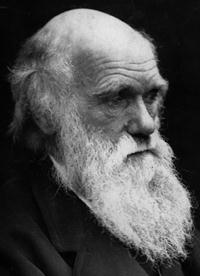|
Sponsors:
|
 |
Note: This is an archival page.
For information regarding Darwin Week VI, see: Darwin Week VI
Welcome
to...
Darwin
Week in Charleston
February
7 - 10, 2005
The
Public is Invited
to the fifth annual observance
of Darwin Week in Charleston. We've got an exciting series of
events on the schedule! All are free. But
arrive early - seats
fill up fast!
All
Talks are scheduled for
late afternoon hours in Room 121 of
the College of Charleston Science Center,
recently
named in honor of Rita Liddy Hollings. The CofC Science Center is
located
on the NE corner of Coming and George Streets. Parking is
available in
the
City Carage on the corner of St. Philip and George, two blocks east.
Each
talk will be followed by an opportunity to meet the speaker over
refreshments.
Monday, February 7 - Dr. Jerry F.
McManus
Climate Instability: Sun, Sea, and Snow.
Throughout the recent geological past, sun, sea and snow have combined
to make the North Atlantic regional climate dramatically
unstable. Evidence for climate variability and clues about its
causes can be deciphered using "proxies" of past changes that are
recorded in deep-sea sediments. Deep drilling into the sea floor
has allowed the recovery of these sediments, and multi-proxy analyses
reveal that meltwater from ice sheets repeatedly weakened the ocean
circulation and cooled the region. Could it happen again? Dr. Jerry McManus
is Associate Scientist in the Geology and Geophysics Group at
Woods Hole Oceanographic Institution. Sponsored by the US Science Support Program,
together with the Joint
Oceanographic Institutions.
4:00 PM, Room 121.
Tuesday, February 8 - Dr. Matt Cartmill Wednesday, February 9 - Dr.
David F. Jackson Thursday, February 10 - Dr.
Robert J. Dukes, Jr.
Evolution, Creation, and Eternity.
What's wrong with the "Creation" part of "Creation Science?"
Together we'll explore the relationship between science and religion,
with reference to the perennial fight in this country between the
scientific theory of evolution and the religious doctrine of
creation. Dr. Matt Cartmill
is Professor of biological anthropology and anatomy at Duke
University. He is a past president of the American Association of
Physical Anthropologists and a Fellow of the AAAS. Phi Beta Kappa
Distinguished Lectureship.
5:00 PM, Room 121.
Teaching about Evolution,
Historical Geology, and Cosmology in Public Schools:
Sifting the Relationship between
Personal and Professional Beliefs and Practices.
Controversies about public school curriculum arising from perceived
conflicts between science and religion are commonly thought to be legal
and political issues largely limited to high school biology. In fact,
at least in the Southeastern U.S., the issue raises its head early and
often in middle schools, in earth science, and in university teacher
education courses as well, and can involve a complex relationship
between the personal beliefs and professional practices of teachers.
This presentation will illustrate the range of points of view brought
to the profession by practicing and prospective middle school science
teachers in Georgia, and suggest some effective approaches to
presenting evolution as a controversial topic in the multicultural
world of education while remaining true to the spirit of science.
Dr.
David Jackson is Associate Professor of Science Education at the
University of Georgia and a former middle school earth science teacher
and research assistant in paleontology. Download
Dr. Jackson's handout as an MS word Document!
4:00 PM, Room 121.
The Ancient Universe.
How old is the universe? And more importantly, what is the
process by which our theory regarding the age of the universe has
developed? This lecture is the first of a series sponsored by the
Charleston Chapter of Sigma Xi celebrating the 100th anniversary of
Albert Einstein's "Miraculous
Year." Dr. Bob Dukes
is a professor in the Department of Physics and Astronomy at the
College of Charleston, and the current president of our local Sigma Xi
chapter.
4:00 PM, Room 121.
This page brought to you by:
Dr. Rob Dillon
Secretary, Charleston Chapter of Sigma Xi